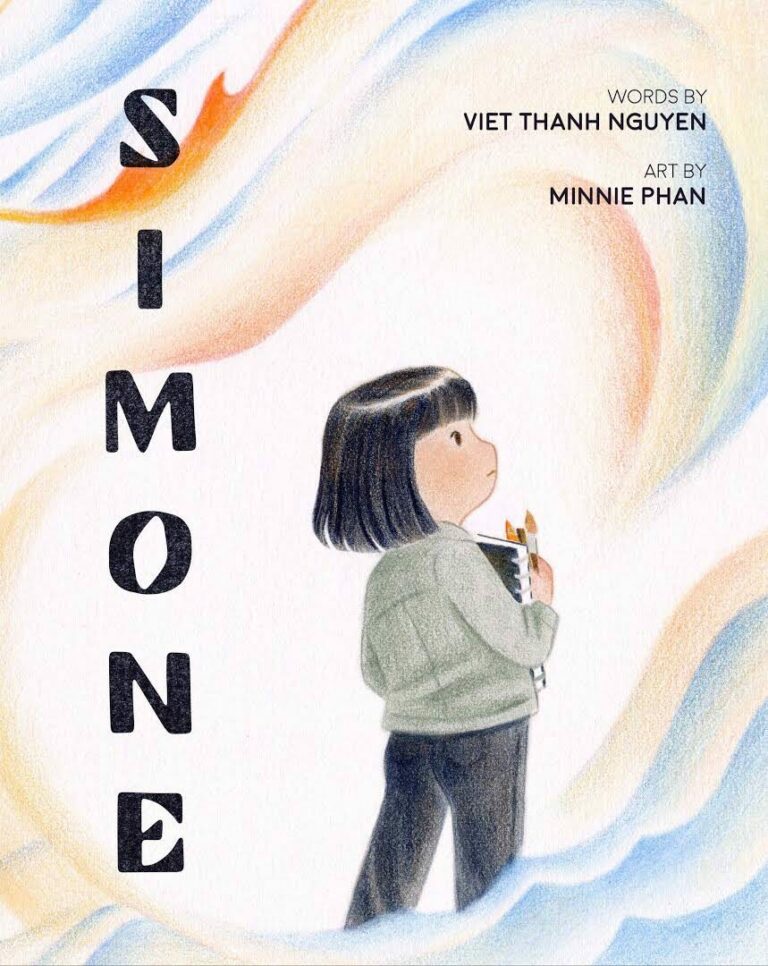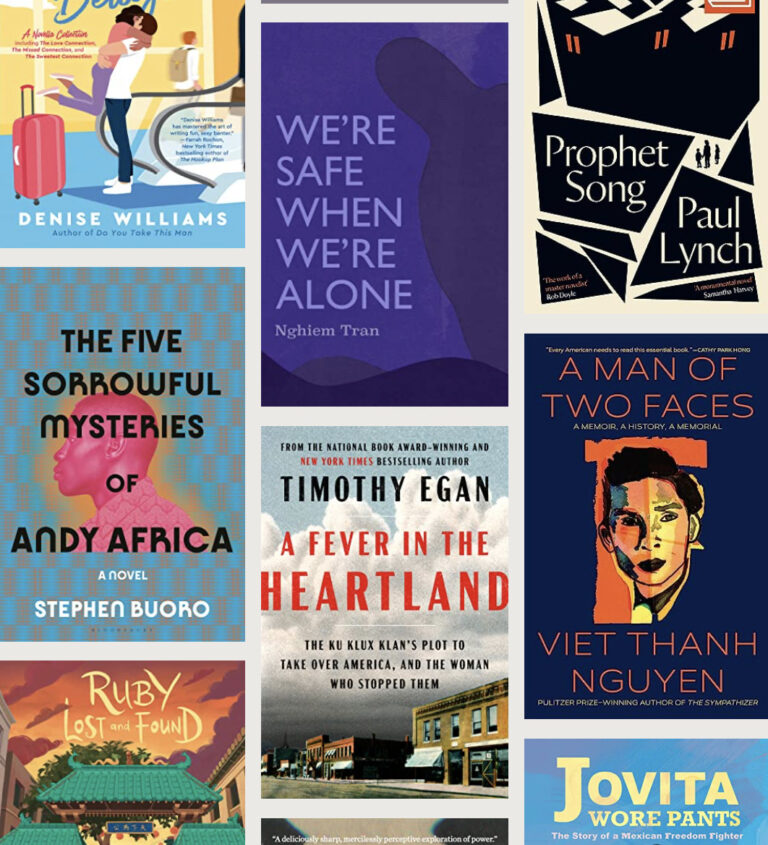Megan Galbraith of Consequence Magazine reviews The Sympathizer by Viet Thanh Nguyen.

I’m not going to lie; The Sympathizer is a challenging read. It is also a necessary, haunting, and astonishing first novel. Viet Thanh Nguyen’s book forces readers to examine the role the U.S. played in Vietnam and the far-reaching consequences of American action on Vietnamese citizens, be they farmers, students, soldiers—or spies. In an NPR interview, Nguyen said that as a child he absorbed a “sense of a persistent memory, of persistent trauma, of this feeling that the war was not over, and that the country had been lost, and that we still hoped that one day we would take that country back.”
But what does it mean to take a country back when that country has ceased to exist outside such memory-draped boundaries?
The book opens with an unnamed Vietnamese character, the captain, confessing his life as a double agent for the Communists and the Americans. But he could very well also be describing the diaspora he feels as an immigrant, as an illegitimate child, as a man whose allegiances are, not surprisingly, based on a “blood-brother” pact.
“I am a spy, a sleeper, a spook, a man of two faces. Perhaps, not surprisingly, of two minds.”
This first Dickensian sentence is an evocative foreshadow of what’s to come. On its face, it seems to be an honest confession. Yet the confession is much more complicated than even the captain knows, and each disclosure leads to the penultimate admission, one that strains and illuminates the bonds of commitment and loyalty.
Throughout the novel we are introduced to unnamed characters who serve as archetypes. There’s the captain, who is both protagonist and antagonist in his role as a spy. We meet the General who is in a “profound funk … vacillating between fury and melancholy as one might imagine Richard Nixon to be doing not far away.” Then there is the crapulent major, whom the captain plots to assassinate; the auteur; the dean (whose heinous racism cloaked in an appreciation for all things Asian assaults the captain daily in his “cover” job); the Commandant; the Commissar; the captain’s friend and roommate Bon; and Man, his handler and boyhood “blood brother.”
What are archetypes if not the embodiment of stereotypes? In depicting his characters this way, Nguyen depersonalizes them, using the same type of militaristic language that renders them faceless, nameless “enemy combatants.” Nguyen elevates their collected stories to a morality play and underscores the dehumanizing, parsed language used in war and torture – “enhanced interrogation,” “targets,” “We tortured some folks.” This serves to stitch together the relationship between language and violence, which is a code unto itself. Nguyen shows us that through this complicated, encrypted, and “unhuman” way of communicating during war that language itself becomes bastardized.
Yet the captain wants to understand “how close the human is to the inhuman.” Nguyen asks us to see how good and evil co-exist within each of these characters. “We’re all innocent on one level and guilty on another. Isn’t that what Original Sin is all about?” says the captain.
At its heart, The Sympathizer is about cognitive dissonance: About the discomfort of a narrator who balances contradictory beliefs, ideas, and values. It is about a man living an existential nightmare against the backdrop of the sheer and persistent terror that was the Vietnam War.
This is a book that begs you to read into the brocade of its meanings. Encoded messages are everywhere, pleading to be found just like the invisible messages the character writes in cornstarch between the lines of letters he pens home. The intensity and weight of each sentence is so astonishingly artful that each deserves to be read twice (or three times) so as not to miss a single clue or nuance. Words carry many meanings in The Sympathizer. Pay close attention. Nguyen’s healthy obsession with shades of meaning becomes an encoded way of delivering two messages at once. Read every single line as if you were of two minds.
Apart from his character’s struggle as a spy, his own demons, which include being born an illegitimate child to a peasant Vietnamese mother and a mysterious French priest, harass the narrator. His use of the term “bastard,” for instance, is pregnant with twinned meaning. It means that of a child born to unmarried parents (as his character is), and that of a person who does despicable things (as his character does by lying, assassinating friends, and overseeing the rape and torture of a colleague without blowing his own cover.)
Or his use of the verb to cleave, “which meant both to cut apart and to put together. A woman’s cleavage perfectly illustrated this double and contradictory meaning. The breasts, two separate entities with one identity.” One of Nguyen’s central plot points revolves around the captain’s deep attachment to his mother, who was perhaps his one pure love, but whose death caused a primal wound. She is the subject of many artfully organized flashbacks that serve to show the ‘real’ captain.
Nguyen weaves an intricate, layered story of a character who faces the cataclysmic dread of being found out on a daily (if not hourly) basis, yet who also desperately wants to find his own identity and place himself within a familiar and familial context. Yes, he identifies as a double agent, but he also identifies as “illegitimate, bastard, Eurasian, Amerasian, love child, natural child.”
The captain is an incredibly complex character who also belongs nowhere. He is forever doomed to be between two worlds, but ‘of’ none. He is a cipher, a paradox. In this way, The Sympathizer serves as a deep interrogation of the self, of politics, culture, friendship, language, and love. It is told through a prism, which allows the narrative to become both an encouragement and an indictment of these subjects. Its greatest achievement is that it aims to cross-examine these concepts through the lens of the captain’s defining experiences. He goes about his day creating allegiances on both sides, plotting assassinations, befriending enemies, and making secret enemies of friends. All the while his own fragile sense of identity is crumbling.
“Here (in America) you can learn how not to be torn apart by your opposing sides, but rather balance them and benefit from both. Reconcile your divided allegiances and you will be the ideal translator between two sides, a Goodwill ambassador to bring opposing nations to peace.”
But this narrator finds no peace. He is a prisoner of himself. Increasingly he is being asked to do the wrong thing for the right reasons – like plot an assassination on his boyhood friend or on the crapulent major whom he thinks does not deserve to die. But “right and wrong” are fungible in this novel depending upon whose interests – Communist or American – he is serving at the time.
This is a carefully plaited novel with minor, major and Meta plot twists. The Sympathizer is a brilliant achievement because it succeeds on all these levels. Even the dialogue circles back upon itself as the narrator talks about “things he can’t unhear,” or of a bottle of scotch that, “like me it was half empty and half full.”
This is a character at war with himself, at war with the world, and at war with War.
“We were the greatest anthropologists ever of the American people, which the American people never knew because our field notes were written in our own language in letters and postcards dispatched to our countries of origin, when our relatives read reports with hilarity, confusion and awe. After all, Mama said, we are a people born from the mating of a dragon and a fairy. What could be stranger than that?”
Midway through the novel, the captain is hired to bring “authenticity” to a movie called “The Hamlet,” being made by the auteur about the Vietnam War. (Ngyuen has noted that, while he grew up watching them, he believed films like Apocalypse Now and Hearts of Darkness, offered an Americanized story that didn’t capture what he’d heard from his own Vietnamese family back home or in the United States.) In “The Hamlet” there is a fake torture scene, a movie set of a Vietnamese village, “Vietnamese” extras (who are really Filipino) who die in fake bloody carnage, a faux cemetery replete with headstones—one of which the captain treats as his mother’s tomb–and a very real explosion that places the narrator into the hospital and leads us into a hugely important part of the novel.
As the narrator is healing from the explosion, he awakens in an all-white hospital. This is a metaphorically layered scene that signals both a return to the womb and the narrator’s rebirth, and a reawakened repressed memory— “a deep unease descended on me. The claustrophobic sense that the past was beginning to emerge from these blank walls.”
Ngyuen deploys the color white (which is really a color without a color) to signify a cleansing memory of his beloved mother and to foreshadow repressed and tragic memories of another all-white room in which he was served as chief interrogator in Saigon. It also predicts the culminating scene of his “re-education” at the hands of those to whom he professed his greatest loyalty in his double-agent role. “Your destiny is being a bastard while your talent, as you say, is seeing from two sides. You would be better off if you only saw things from one side. The only cure for being a bastard is to take a side.”
As the novel concludes, the structure of the entire narrative comes full circle. A spy for two nations living in the U.S. returns to his Homeland only to find he can never return home and so returns to the U.S. again as a Vietnamese refugee. In telling us this haunting story, Ngyuen asks us to walk in another person’s shoes, to find a way home or to “take back” a country, to acknowledge connections that may remain unseen, and to bear witness. Nguyen’s characters show us how the razor blade of “truth” can cut both ways and that nothing is more radical than forgiveness.


